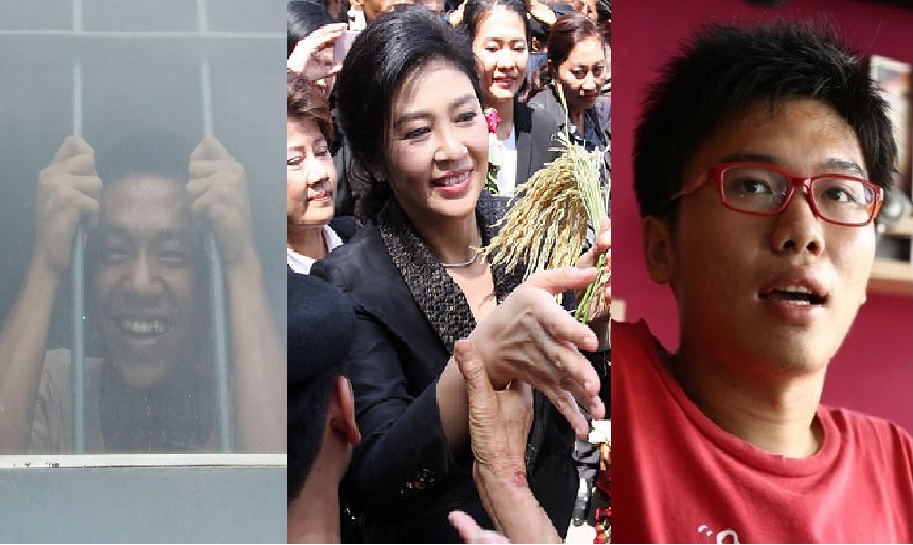Two remarkable lèse majesté cases occurred during the past week. The first is the conviction of Jatupat Boonpattaraksa, also known as Pai Dao Din, the first individual charged under Article 112 in the reign of King Rama X. After being detained since last year December, he decided to
plead guilty on 15 August and received a jail term of 2 years and six months.
Kritsadang Nutcharus, Pai’s defence lawyer, revealed that his client initially wanted to use his case to show to the public the injustice of the judicial process that he has had to undergo. But since the court announced that the entire trial would be held in secret, his goal cannot be achieved so he decided to plead guilty.
Pai is charged with lèse majesté for sharing on his Facebook account a controversial biography of King Vajiralongkorn published by BBC Thai. Despite the fact that more than 2,000 people shared the same article on Facebook and millions read it, he was the only one prosecuted for lèse majesté.
Another historic lèse majesté lawsuit is the
prosecution of a 14-year-old. On 16 August, the Attorney-General indicted eight individuals (identities withheld due to privacy concerns) on lèse majesté charges. The eight were accused of burning several portraits of the late King Bhumibol and King Vajiralongkorn in Khon Kaen.
The upcoming week is full of crucial prosecutions as well. The first is on 21 August when five scholars in Chiang Mai will respond to a summons to a military camp for attending the 13th International Conference on Thai Studies between 15 and 18 July. The five individuals are Chayan Vaddhanaphuti, Chaipong Samnieng, Teeramon Buangam, Nontawat Machaiand Pakavadi Veerapaspong.
They were deemed in breach of NCPO Head Order No. 3/2015, the junta’s ban on public gatherings of five people or more.
Various human rights organisations have launched statements demanding the junta cancel the prosecution of the scholars. These include Scholars at Risk, Human Rights Watch, the Human Rights and Development Foundation, and the Union for Civil Liberty.
While the prosecution against the academics is just starting, three other important cases will be finalised on 25 August. The first two come as a package and are related to the
Rice Pledging Scheme (RPS). The Supreme Court’s Criminal Division for Persons Holding Political Positions will read the verdicts in the cases against Yingluck Shinawatra, former PM; and Boonsong Teriyapirom, former Minister of Commerce.
The prosecution of Boonsong began after National Anti-Corruption Commission (NACC) on 20 January 2015 found him and 28 other defendants guilty. Boonsong was appointed to manage the sale of rice from the RPS to China under a government-to-government agreement. However, the NACC found that the rice was actually sold to Thai companies that have connections with Boonsong.
Boonsong’s lawsuit subsequently led to Yingluck’s prosecution. She is charged with being responsible for the massive corruption that Boonsong allegedly committed and the huge deficits from the RPS. If found guilty, Yingluck will have to pay 35 billion baht in damages, equal to 20 per cent of the estimated total loss arising from the policy.
Various politicians and academics have expressed concerns about the prosecutions because it could set a new standard for Thai public policies. Weera Wongsatjachock, a lecturer at Burapha University’s Faculty of Political Science and Law, stated that the trial will make future governments hesitate to institute welfare or protectionist policies that risk large deficits.
“Unlike the private sector, the government is a public service provider. They don’t care how profitable a policy is, but rather how it helps people’s livelihoods and how much deficit is acceptable,” Weera argued.
The third verdict will not be read in a courtroom but in a university. Chulalongkorn University (CU) will announce its verdict against Netiwit Chotiphatphaisal, a progressive student activist and President of CU’s Student Council.
Netiwit and seven other student activists are accused of displaying “improper behaviour” after they staged a protest during a university initiation ceremony. Netiwit is further accused of using university premises without permission when he hosted a public hearing at the Student Council office to hear complaints and requests about a CU commercial development project.
Various famous academics have called on CU to abandon the investigation against the students.
The most outstanding is Noam Chomsky who sent an email to Netiwit, writing that he hopes the persecution against the activist will soon end so he can continue his mission to promote democracy.
The Thai people will know on 25 August whether Thailand’s top university can tolerate different opinions and whether Thai politicians can be punished for merely running a failed policy.

